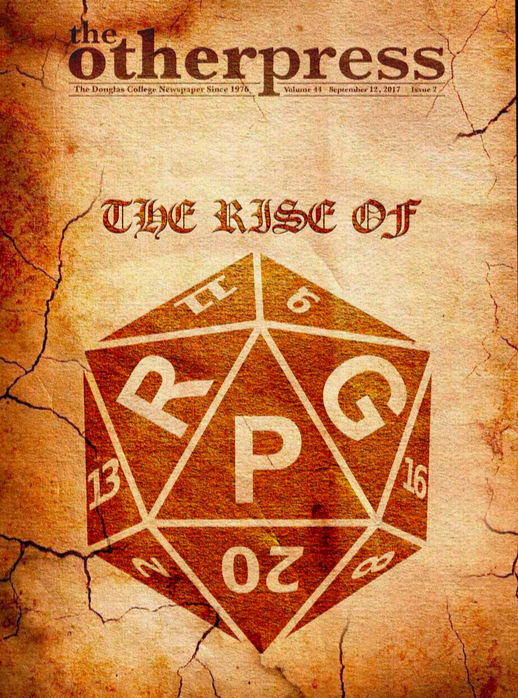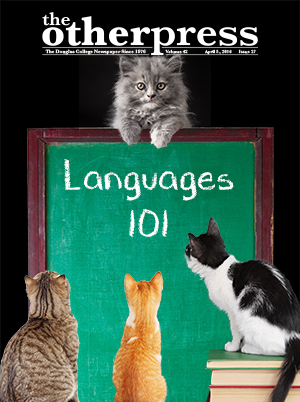
Dungeons, dragons, and the rise of the RPG
By Rebecca Peterson, Assistant Editor
By day, I am a student. I am an editor of a school newspaper, a freelancer, and a coffeeholic who doesn’t work out nearly as much as she should. The most adrenaline-filled encounter I’ve had over the last few months has been an ongoing battle of wills between me and the spindly, creepy-looking spider in my bathroom. I’ve named him Pablo.
Once a week by night, however, I become the tiny but mighty Kala Greenwood, a gnome warlock chained to a powerful elemental deity from the Primordial Plane. I cast lightning at fools who dare cross me, can turn invisible at a whim, and has thus far only accidentally killed one party member during the course of our campaign (sorry, Greg).
I, like many people my age, have been sucked in to the wonderful, wild world of Dungeons & Dragons, one of the oldest and most popular role-playing games in history. A decade ago, knowledge of D&D was fairly niche in nature, an in-joke even amongst the broader “geek” community (especially after the release of a terrible film based off the game—seriously, it’s soul-destroyingly awful). However, as pop culture has turned in favour of all things geek, so too has D&D entered the mainstream. Mentions of the game in popular comedy shows such as Community and, unfortunately, The Big Bang Theory have stirred curiosity, while online streaming shows and podcasts like Critical Role and The Adventure Zone have shown that even simply watching and listening in on a campaign can be great fun, never mind playing a role. The trajectory of D&D from the perceived basement-dweller’s math game to a fun and challenging bond-building adventure with friends is more than a little fascinating, and says quite a lot about current popular culture trends.
Created in 1974 by Gary Gygax and David Arneson, D&D was formulated as a departure from classic strategy games which largely focused on military movements, rather than the adventures of individual characters. Since its inception, there have been many different new versions based off the original template, both officially and unofficially. Players are encouraged to mix their own lore and world-building in with the game. You might hear mentions of “3rd edition,” “5e,” and “Pathfinder,” as well as the term “homebrew.” The first three are different versions of the original game—“homebrew” refers to the practice of modifying world-building and even basic rules to fit the game master’s vision for the game.
The learning curve is notoriously steep in D&D. Even the creation of your first D&D character can be incredibly intimidating, as you’re faced with pages of blank character sheets and asked to build your avatar from the ground up. Choosing a race and class is the easy part—then you’re tasked with rolling different dice for character stats, numbers that will decide how your character perceives the world, how much they remember, how fast they can move, how well they can track people, how good they are in combat, even how skilled they are at ducking and dodging. This is all before choosing what kind of provisions you have, what kind of weapons you use—all compounded into something vastly more complicated if you choose a magic-casting class.
Once you get past all this, however—and once you become familiar with the combat system (roll for initiative, roll to attack, roll for damage, etc., etc.)—you’re let loose into a world created by you, your teammates, and your omnipotent game master (the “dungeon master” in D&D specifically). Players are encouraged to give their characters their own voices and personalities, tapping into a side of oneself that may have been left behind long ago on the elementary school playground. At its most simplistic, after all, D&D is essentially an elaborate game of make-believe.
With math.
Douglas College is not immune to the D&D bug—in fact, there is a Douglas College D&D Club that helps to connect potential players with dungeon masters looking to start a campaign or run expeditions (shorter, one-shot games that can be completed in a single session). Their Facebook page is open for anyone to join, regardless of experience level. Most dungeon masters are happy to help newer players get a hang of the adventure, and are an excellent resource for questions throughout the game.
Dedicated readers of the Other Press may notice that we talk about D&D a lot in this paper, especially in the Life and Style and Humour sections. This is in no small part due to the high percentage of D&D players on the writing staff.
“I used to think D&D was too complex and had too much math before I started playing,” said Greg Waldock, one of our staff writers, when asked about his D&D experience. “Now I think it’s basically drama class.”
Davie Wong, our Sports Editor and dungeon master for several members of the Other Press, holds a very special place in his heart for D&D.
“Playing D&D offers me an opportunity to hang out with my friends when I normally wouldn’t have time,” said Wong. “It’s my weekly escape from the grit and grind of the college life. D&D allows me to express myself in a creative way, and in a way that I normally don’t get to do … D&D has the potential to be so much bigger than it is. There are a lot of therapeutic uses for the game, and I absolutely think those should be explored.”
This is an alluring idea, and one that has caught on in the mental health community. According to an article by the BBC, therapists are starting to use D&D to help patients, especially children, access emotions and process trauma in a safe and even fun environment. The use of roleplaying in therapy has been a well-respected practice for decades, allowing patients to walk through scenarios in the safety of a therapist’s office. The addition of fantasy elements and a combat system does not detract from the benefits; if anything, it gives one a sense of distance from whatever is causing them pain.
D&D provides a space for the imagination to let loose. It helps lift barriers—in the space of a session, a person who is shy might play a character who is bold and outgoing. Someone who feels helpless and powerless in the real world might find strength and courage in a battle against a necromancer. It gives people the power to be themselves in entirely new and exciting ways.
It allows me, an uncoordinated and decidedly unmagical giant, a chance to kick ass as a tiny gnomish powerhouse. At least once a week, anyway.
For more information on the Douglas D&D club, check out the Facebook page titled “Douglas College D&D.”


